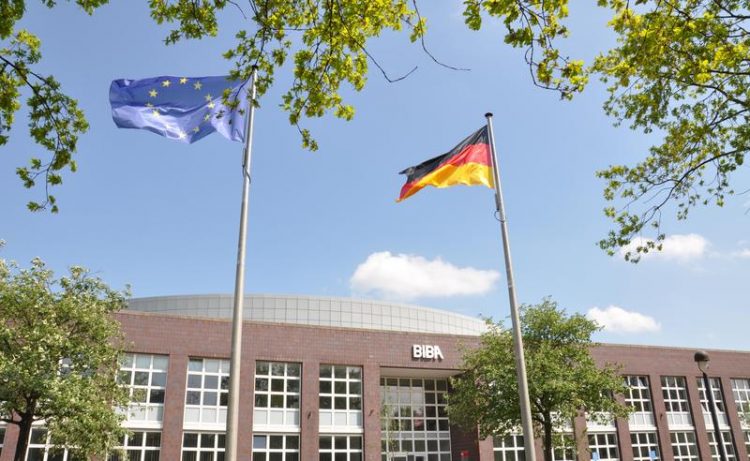Systematically avoid damages and failures in production with predictive maintenance

BIBA - Bremer Institut für Produktion und Logistik at the University of Bremen (Germany) coordinates the European research project "UPTIME" with 11 partners from 6 countries. Photo: Sabine Nollmann for BIBA
The use of new production techniques can reduce failure rates, times due to repairs and unplanned equipment downtime. According to the estimation by the EU, this may increase the effectiveness of operations by up to 10 percent.
BIBA – Bremer Institut für Produktion und Logistik at the University of Bremen also sees a great potential for savings in this field and has initiated the „UPTIME“ project with 11 partners from 6 EU countries. The research project has been granted by the EU and meanwhile, it has begun – under the leadership of the Bremen scientists.
UPTIME (Unified Predictive Maintenance System) is a three-year project, starting in September 2017, with a total budget of more than 6 million euros. 4.8 million euros will be funded by the EU under the Horizon 2020 programme, of which about 1 million euros will be received by the consortium leader BIBA.
Besides the research and development partners, the project also supported by three end-users from home appliance industry, Whirlpool EMEA, Italy, steel industry, M.J. Maillis, Greece and production and test systems provider, FFT, Germany.
Identify the need for maintenance and repairs early and perform them at the optimal time
The aim of the project is to develop methods and tools for improving maintainability and increasing lifetime of production systems. The solution lies in predictive maintenance. In the future, maintenance and repairs will be carried out at the optimal time with the least possible effort using the new technology and a system based on it with intelligent components, thus avoiding costly repairs and shortening or even at best preventing machine downtimes.
The purpose of the system that the UPTIME project partners are going to develop is to identify and correct potential or likely failures in advance is. It is a toolkit that provides recommendations for action using state data directly from the machines in the production. One of the prerequisites to enable this is, among other things, intelligent components and the use of sensors, which record vibrations, for example via vibration transducers, and report them to the UPTIME system.
With the help of the data obtained from production and the algorithms developed in the project (rules to solve the problems), information including timely indications and recommendations for any urgently required or advisable maintenance work will be generated.
“Increasing efficiency by 10 percent in production is possible”
“In view of the rapid technological advancements, I believe that an increase of production efficiency by 10 percent through predictive maintenance is possible,” says BIBA Director Professor Dr.-Ing. Klaus-Dieter Thoben. “Such developments as in this innovation project will also enable small and medium-sized enterprises to overcome the challenges of the digital revolution with their changes in production and value-added processes and to make better use of the benefits of digitization.”
Attention editors:
Pictures regarding this press release can be found at www.biba.uni-bremen.de/presse/pressemitteilungen/2018 or via Sabine Nollmann (e-mail: mail@kontexta.de, mobile: +49 (0)170 904 11 67)
Contacts:
Prof. Dr.-Ing. Klaus-Dieter Thoben (BIBA Director)
phone: +49 (0)421 218-500 06, e-mail: tho@biba.uni-bremen.de
Dipl.-Inf. Karl A. Hribernik (BIBA, Project Coordination UPTIME)
phone: +49 (0)421 218-501 08, e-mail: hri@biba.uni-bremen.de
Indah Lengkong, M.Sc. (BIBA, Project Management UPTIME)
phone: +49 (0)421 218-501 89, e-mail: len@biba.uni-bremen.de
http://www.biba.uni-bremen.de
http://www.uptime-h2020.eu
http://www.biba.uni-bremen.de
Media Contact
Alle Nachrichten aus der Kategorie: Informationstechnologie
Neuerungen und Entwicklungen auf den Gebieten der Informations- und Datenverarbeitung sowie der dafür benötigten Hardware finden Sie hier zusammengefasst.
Unter anderem erhalten Sie Informationen aus den Teilbereichen: IT-Dienstleistungen, IT-Architektur, IT-Management und Telekommunikation.
Neueste Beiträge

Anlagenkonzepte für die Fertigung von Bipolarplatten, MEAs und Drucktanks
Grüner Wasserstoff zählt zu den Energieträgern der Zukunft. Um ihn in großen Mengen zu erzeugen, zu speichern und wieder in elektrische Energie zu wandeln, bedarf es effizienter und skalierbarer Fertigungsprozesse…

Ausfallsichere Dehnungssensoren ohne Stromverbrauch
Um die Sicherheit von Brücken, Kränen, Pipelines, Windrädern und vielem mehr zu überwachen, werden Dehnungssensoren benötigt. Eine grundlegend neue Technologie dafür haben Wissenschaftlerinnen und Wissenschaftler aus Bochum und Paderborn entwickelt….

Dauerlastfähige Wechselrichter
… ermöglichen deutliche Leistungssteigerung elektrischer Antriebe. Überhitzende Komponenten limitieren die Leistungsfähigkeit von Antriebssträngen bei Elektrofahrzeugen erheblich. Wechselrichtern fällt dabei eine große thermische Last zu, weshalb sie unter hohem Energieaufwand aktiv…





















